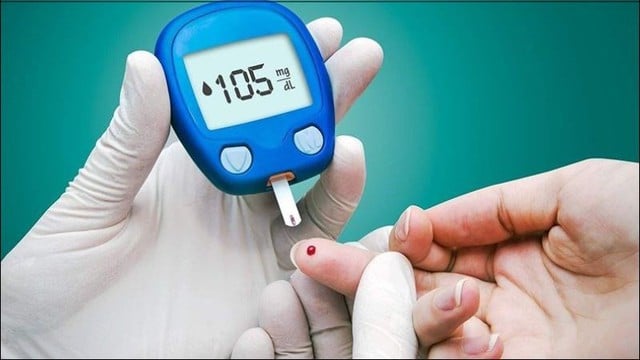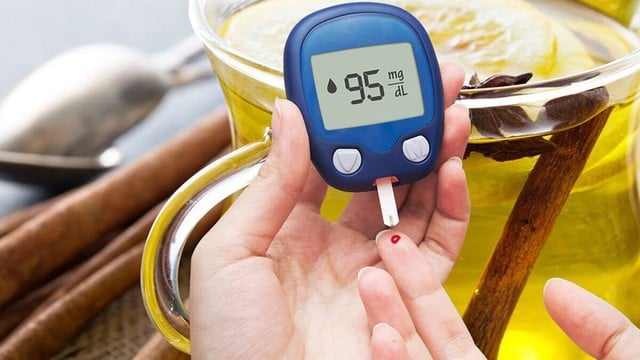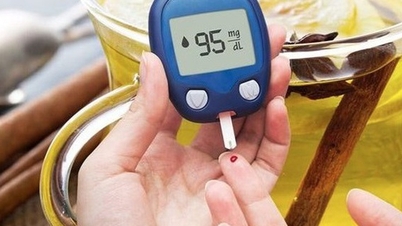GĐXH - If diabetes is not controlled, it will cause many dangerous complications such as cardiovascular disease, stroke, damage to cerebral blood vessels, loss of vision and kidney failure...
Diabetes, also known as diabetes mellitus, if not controlled, will cause many dangerous complications such as cardiovascular disease, stroke, damage to cerebral blood vessels, loss of vision and kidney failure... Diabetes treatment aims to stabilize blood sugar , thereby helping to maintain complications caused by the disease.
For people with diabetes, controlling their diet is the best way to control blood sugar, helping to limit or slow down the time it takes to use Western medicine.

Illustration
People with diabetes, how high blood sugar must take medication?
We use blood glucose tests to check for diabetes and plan treatment. When measuring blood glucose before meals (fasting blood glucose), a result of 100 mg/dL to 125 mg/dL is considered to be at risk for diabetes.
If you have two fasting blood sugar tests ≥ 126 mg/dL, you are considered to have diabetes. Once we know you have diabetes, your doctor will guide you on medication and develop a suitable diet and lifestyle.
In fact, people with type 1 diabetes usually need insulin injections to control their blood sugar. Meanwhile, people with type 2 diabetes usually start with lifestyle changes, adjusting their diet and exercising. Therefore, treatment and lifestyle vary depending on the type of diabetes and each person's personal health condition.
When should diabetics stop taking diabetes medication?
In fact, taking diabetes medication does not necessarily have to be lifelong. In some cases, the doctor may consider reducing the dose or temporarily stopping the use of hypoglycemic drugs.
In some cases, the dose may be reduced or the use of diabetes medication may be discontinued, such as:
Stable blood sugar indicators include: HbA1c
Patients are often prescribed a reduced dose or a temporary discontinuation of medication and must strictly adhere to a diet and lifestyle regimen as required by their doctor to maintain stable levels. In particular, when stopping medication, patients must regularly monitor their blood sugar at home and have regular health check-ups.
Patients should avoid stopping taking diabetes medication when symptoms improve, because symptoms do not reflect the actual condition. Doing so is dangerous, does not control blood sugar and causes complications to appear early.
What should diabetics do to maintain stable blood sugar?

Illustration
To maintain good health and control diabetes, you can follow a healthy diet and take some of the following measures:
- Monitor your blood sugar levels : Depending on your type of diabetes, you will need to monitor your blood sugar levels. This can be done by measuring your blood sugar before and after meals, and following your doctor's advice.
- Portion management : Be thoughtful about how much you eat and what types of foods you choose. A typical way is to use the plate method, which is dividing your plate into two non-starchy vegetables, one protein food, and one starchy food like corn, potatoes, or rice.
- Weight control : Maintaining a healthy weight is important. If you are overweight, try to lose weight safely through a balanced diet and regular exercise.
- Make smart food choices : Limit foods high in sugar, calories, saturated fat, and salt. Focus on high-fiber foods and foods with a low glycemic index.
- Replace sweets with fruit : When you want to enjoy sweets, choose fresh and nutritious fruit.
- Exercise : Exercise regularly, at least 30 minutes a day, 5 days a week. Exercise helps improve cardiovascular health, control blood sugar and reduce the risk of diabetes.
Source: https://giadinh.suckhoedoisong.vn/do-duong-huyet-duong-huyet-cao-bao-nhieu-thi-can-uong-thuoc-172250328114314481.htm


![[Photo] Prime Minister Pham Minh Chinh chairs meeting to review preparations for trade negotiations with the United States](https://vphoto.vietnam.vn/thumb/1200x675/vietnam/resource/IMAGE/2025/5/6/1edc3a9bab5e48db95318758f019b99b)
![[Photo] Sparkling lanterns to celebrate Vesak 2025](https://vphoto.vietnam.vn/thumb/1200x675/vietnam/resource/IMAGE/2025/5/7/a6c8ff3bef964a2f90c6fab80ae197c3)



























![[Photo] Prime Minister Pham Minh Chinh receives Mr. Tomas Heidar, Chief Justice of the International Tribunal for the Law of the Sea (ITLOS)](https://vphoto.vietnam.vn/thumb/1200x675/vietnam/resource/IMAGE/2025/5/6/58ba7a6773444e17bd987187397e4a1b)






























































Comment (0)